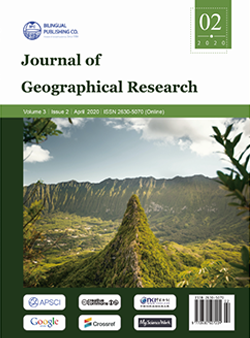-
1425
-
298
-
286
-
268
-
204
Socio-Economic and Environmental Impacts Assessment of Using Different Rainwater Harvesting Techniques in Sarida Catchment, West Bank, Palestine
DOI:
https://doi.org/10.30564/jgr.v3i2.1974Abstract
A statistically representative questionnaire targeted people using rainwater harvesting (RWH) techniques in rural communities of Sarida catchment,West Bank, Palestine was distributed and analyzed. The main objective of this study is to assess the social, economic, and environmental impacts of adopting RWH techniques (e.g. cisterns, concrete and clay ponds, Wadi ponds, earth dams, and stone terraces) in different uses to increase water availability. The results showed a simple sharing of the female component among beneficiaries, while concrete ponds and cisterns were the most used techniques. Actually, social impacts were noticeable by sharing the same RWH structure and reflected to responsibility skills and role exchange increases. On the other hand, RWH techniques showed a significant economic impact for end users represented by enhancing domestic, agricultural,and recreational activities leading to good profit increase. In addition to food security as output, the most important environmental impact was water wasting prevention, which in turn could be linked to sustainable water management and considered as universal challenge for future generations.Keywords:
Rainwater harvesting; Social; Economic; Environment; Food security; Sarida; West Bank; PalestineReferences
[1] MPhil, J.. Risk Assessment of Rooftop collected Rainwater for Individual Household and Community Use in Central Kerala, India. National Environmental Health Association, 2013, 76: 6.
[2] Sarikonda, S.. Analysis And Quality Of Roof-Harvested Rainwater: Potable Water Supply In Developing Areas,Faculty of the Graduate School, Agricultural and Mechanical College, The Department of Civil and Environmental Engineering, Southern University,2010.
[3] Rahman, S., Khan, M., Akib, Sh., Din, N., Biswas,S.,Shirazi. S.M.. Sustainability of Rainwater Harvesting System in terms of Water Quality, Department of Chemical Engineering, Jessore University of Science and Trchnology, Jessore 7408, Bangladesh, 2014.
[4] Shadeed, S.; Judeh, T., Almasri, M.. Developing GISbased water poverty and rainwater harvesting suitability maps for domestic use in the dead sea region (West Bank, Palestine). Hydrol. Earth Syst. Sci.2019, 23:1581-1592.
[5] Shadeed, S.. Developing a GIS-based suitability map for rainwater harvesting in the West Bank,Palestine.In Proceedings of the International Conference on Environmental Education for Sustainable Development:Plugging the Hole, Birzeit University, Palestine, 16-17 November 2011, 13: 2011.
[6] Lim, K-Y, Jiang, S.C.. Reevaluation of health risk benchmark for sustainable water practice through risk analysis of rooftop-harvested rainwater. Water research,2013, 47: 7273 -7286.
[7] Land Research Center - LRC. Water Harvesting Techniques for Wadi Abu Hindi Watershed / East Jerusalem,November.
[8] Tamimi L.. Rainwater Harvesting System: Quality And Impacts On Public Health, Faculty of Graduate Studies,Birzeit University, 2016.
[9] Al Zayed, I. S., Ribbe L., Al Salhi A.. Water Harvesting and Flashflood Mitigation-Wadi Watier Case Study (South Sinai, Egypt), International Journal of Water Resources and Arid Environments,2013, 102-109.
[10] Rimfors O., Velichkin V.. Hydrological Modeling of Al Auja earth dam in the lower Jordan Valley, Royal Institute of Technology (KTH), TRITA-LWR Degree Project, 2015.
[11] Abu Hammad A., Borressen T.. Socioeconomic Factors Affecting Farmers’ Perceptions of Land Degradation and Stone wall Terraces in Central Palestine, Environmental Management, 2006, 37(3):380-94.
[12] Khatib, R.. The impact of Israeli settlements on ruban expansion of residential agglomerations in Salfit Governorate. An-Najah National University, Unpublished Master Thesis, 2008.
[13] Abu Sa’deh, M.. Hazard, Vulnerability, and Risk Mapping for Yatta Municipality. Rep. Ramallah: Hydro Engineering Consultancy. Palestine, 2012.
[14] Ghanem, M.. Hydrology and Hydrochemistry of the Faria Drainage Basin West Bank. Ph.D Thesis, Technische Universitat Bergakademie Freiberg. Freiberg,Germany, 1999.
[15] Issar, A. S.. Water - The Past is the Key to the Future,The Water Resources of Israel, Past Present and Future,2000. http://www.mideastwe.org/water3.html
Downloads
How to Cite
Issue
Article Type
License
Copyright © 2020 Marwan Ghaleb Ghanem, Wasim Ahmed, Sameer Shadeed, Michel Riksen

This is an open access article under the Creative Commons Attribution-NonCommercial 4.0 International (CC BY-NC 4.0) License.




 Marwan Ghaleb Ghanem
Marwan Ghaleb Ghanem





